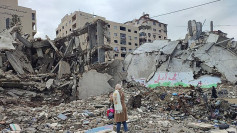Sudan is facing an unprecedented famine crisis fueled by a devastating civil war and compounded by its government's decision to withdraw from a critical global hunger-monitoring system. A report released by the Integrated Food Security Phase Classification (IPC) on Tuesday confirmed that famine has spread to five areas in the country and is projected to extend to ten regions by May. The report described the situation as a "deepening and widening of the food and nutrition crisis" driven by conflict and limited humanitarian access.
The IPC report specifically highlighted dire conditions in North Darfur's Zamzam displacement camp, which hosts over 400,000 people and was first designated as experiencing famine in August. Other affected areas include the Abu Shouk and al-Salam camps in North Darfur, as well as the Western Nuba Mountains. The famine threatens to expand further, with several regions across Darfur and central Sudan identified as at risk in the coming months. Some areas in Khartoum and Gezira are reportedly facing famine-like conditions, although limited data has prevented official confirmation.
On December 23, Sudan's Agriculture Minister Abu Baker al-Beshri announced the government's withdrawal from the IPC system, accusing it of producing "unreliable reports that undermine Sudan's sovereignty and dignity." The decision has drawn significant criticism from humanitarian organizations, which argue that the withdrawal undermines efforts to address one of the world's largest hunger crises. A leader of a non-governmental organization operating in Sudan, speaking on condition of anonymity, stated, "Withdrawal from the IPC system won't change the reality of hunger on the ground. But it deprives the international community of its compass to navigate Sudan's hunger crisis."
Since the civil war erupted in April 2023, Sudan has experienced widespread displacement and food insecurity. The conflict between the Sudanese Armed Forces and the paramilitary Rapid Support Forces (RSF) has killed over 24,000 people and displaced more than 14 million, with 3.2 million seeking refuge in neighboring countries. The war has disrupted agricultural production, devastated infrastructure, and created a scarcity of food in local markets, driving prices beyond the reach of many Sudanese households.
The IPC estimates that 24.6 million people-half of Sudan's population-are experiencing acute food insecurity, with 638,000 already facing famine conditions. The organization emphasized the urgent need for humanitarian assistance, which has been hampered by restricted access in conflict zones, particularly in North Darfur. Dervla Cleary, a senior emergency officer at the U.N.'s Food and Agriculture Organization, described the situation as "unacceptable in a world like today" and called for an immediate cessation of violence to enable aid delivery.
The IPC's ability to monitor and respond to Sudan's crisis has been significantly hindered by the conflict. Data collection has been disrupted, especially in areas controlled by the RSF, leading to delays in famine assessments. Similar challenges have been reported in other conflict-affected countries, such as Myanmar and Yemen, where governments have obstructed or manipulated data. Despite these obstacles, the IPC remains a crucial tool for understanding global hunger trends and coordinating relief efforts.
Alex de Waal, executive director of the World Peace Foundation at Tufts University, condemned Sudan's decision to withdraw from the IPC system, calling it "both pathetic and tragic." He noted that the government's move is part of a historical pattern of denying famine. "Whenever there's a famine in Sudan, they consider it an affront to their sovereignty, prioritizing pride and control over the lives of their citizens," he said.
The crisis has also drawn attention to the broader humanitarian implications of Sudan's conflict. Reports of ethnically motivated killings and rapes have prompted investigations by the International Criminal Court into alleged war crimes and crimes against humanity. Meanwhile, aid organizations continue to warn of the escalating risks posed by the deteriorating food and security situation.






